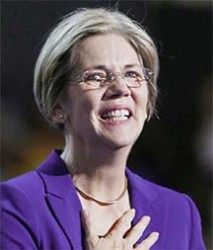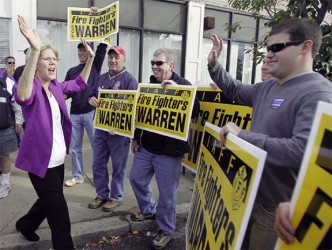Get out your pitchforks, Democrats! A showdown over populism is coming.
The core of the problem is the decline of Democratic support among white working-class voters.
White voters without a college degree made up 36 per cent of the midterm electorate this year. They voted nearly 2-to-1 Republican.

Democrats did not have a compelling economic narrative for them. The economic recovery may be underway, but Democrats dared not talk about it. They would have been met with derision. Working-class Americans haven’t seen any recovery.
Without a strong message on the economy, Democrats had to rely on social issues — women’s rights, immigration, climate change — to rally the party’s liberal base. It didn’t work. Liberals were demoralized by President Barack Obama’s failure to deliver. And liberal social issues don’t have much appeal to the white working class.
Now an unlikely Democratic saviour has emerged to claim the mantle of economic populism: Massachusetts Senator Elizabeth Warren. Warren’s battle cry is aimed directly at the Obama administration: “Enough is enough with Wall Street insiders getting key position after key position and the kind of cronyism we have seen in the executive branch. Enough is enough! … ”
Warren a populist hero? She was a Harvard law professor, the very top of the pinnacle of elite education. While Warren comes from a modest background in Oklahoma — she claims American Indian ancestry — she is not an easily relatable figure for what the British call “the horny-handed sons of toil.” To be fair, neither was Franklin D Roosevelt, with his privileged background and aristocratic accent. Nonetheless, FDR rallied blue-collar whites to the cause of economic populism.
There’s an interesting pattern today in US voting behaviour. The wealthier you are, the more likely you are to vote Republican.
The better educated you are, the more likely you are to vote Democratic. American politics has become a war between two elites — the elite of wealth and the elite of education. In 2012, Mitt Romney was the prince of wealth. Obama was the prince of education.
Earlier this year, New York Times columnist David Brooks made an interesting observation. “If you are a young professional in a major city,” Brooks wrote, “you experience inequality first hand.
But the inequality you experience most acutely is not inequality down, toward the poor; it’s inequality up, toward the rich.” Brooks called it “Blue Inequality” rather than “Red Inequality.”
“Red Inequality” is the resentment of those without a college degree toward the cultural elite. “Blue Inequality” means resentment of the economic elite by the cultural elite.
Well-educated urban professionals resent people similar to themselves “who may have gone to the same [elite] college, who are earning more while benefiting from low tax rates, wielding disproportionate political power, gaining in prestige and contributing seemingly little to the social good.”

The cultural elite is Warren’s constituency. It wants revenge on Wall Street.
Progressive Democrats are building a Warren movement. But the Massachusetts senator has given no indication that she will run for president in 2016. If she were to change her mind, she could be competing against former Secretary of State Hillary Clinton, who demonstrated her populist appeal to Red State Democrats in 2008.
Progressives denounce Clinton’s ties to Wall Street, just like they have long denounced her husband’s. As president, Bill Clinton deregulated the financial industry. Progressives see that as paving the way for the abuses that led to the 2008 financial collapse.
In the 2008 Democratic primaries, Obama got his strongest support from educated upper-middle-class voters, plus African-Americans. Clinton got the white working-class vote. She demolished Obama in West Virginia, Kentucky, Arkansas and Tennessee. When Clinton recalled her grandfather teaching her to shoot as a child in Pennsylvania, Obama mocked her for “talking like she’s Annie Oakley.” Obama disparaged small-town Pennsylvania voters who “cling to guns or religion.” Clinton beat Obama by 10 points in Pennsylvania.
Every modern Democratic presidential race ends up with two candidates: a populist and a progressive.
The populist gets support from working-class voters. The progressive gets support from highly educated “NPR Democrats.” In the 1950s, it was Adlai Stevenson the progressive versus Estes Kefauver the coonskin-hat-wearing populist. In 1968, it was Eugene McCarthy the progressive versus Robert F Kennedy the populist. In 1984, it was Gary Hart (progressive) versus Walter Mondale (populist). In 1992, it was Paul Tsongas (progressive) versus Bill Clinton (populist). In 2000, it was Bill Bradley (progressive) versus Vice President Al Gore (populist). In 2008, it was Obama (progressive) versus Hillary Clinton (populist).
If she runs in 2016, Clinton will undoubtedly face a challenge from her left. It may not be Warren — but it will be somebody. Democrats are auditioning for the role right now (Maryland Governor Martin O’Malley, former Senator James Webb, Senator Bernie Sanders [I-Vt], probably others).
To win the white working-class vote, Democrats will need a candidate who not only champions their economic interests but is also culturally relatable. Only one Democratic presidential candidate in the past 35 years has managed to erase the Republican advantage among white working-class voters. That was Bill Clinton. He did it twice, in 1992 and again in 1996.
He won both elections.





